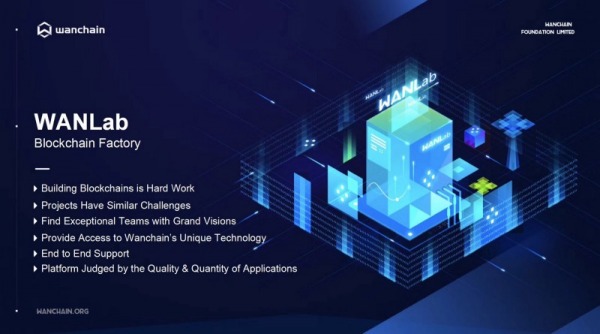Wanchain, the Austin-based project with roots in China, is driven by the ambition to link various digital assets through its cross-chain mechanism. They have revealed that their new blockchain accelerator and incubator, WANLab, has admitted its first class of ICO projects.
Wanchain is a distributed ledger technology that aims to serve as the backbone for cross-chain interactions in the digital finance space. They believe that the cross-chain smart contracts served on the Wanchain blockchain will power the transition into a truly digital economy.
At the World Blockchain Forum in Dubai, Wanchain shared that six projects that will receive support from WANLab, including funding, legal and marketing support, and mentorship and guidance. These projects are Abacus, AllSpark, CryptoCurve, Freedium, GameBank, and UTour, .
Project Incubation On the Rise
The WANLab announcement is yet another sign of the growing desire to help blockchain projects accelerate from ICO to growth stage to implementation, with other incubators by Dragonchain and Waves also operating in the space.
By supporting and mentoring the startups behind quality blockchain applications, Wanchain is seeding quality products into a blockchain industry plagued by hype and half-baked apps.
— President of Wanchain, Dustin Byington
Like startup accelerators, blockchain equivalents discover teams with ideas worth implementing, and provide them with the space and resources they need to flourish unfettered by external constraints such as marketing and PR.
The close collaboration with blockchain incubators also serves as an important check on projects, something the unregulated cryptocurrency market is in dire need of – as Vietnamese investors have painfully come to learn.
An often unmentioned benefit of incubation is that the burden of management tasks, such as legal work, becomes less of a distraction for the project team who can focus their energy on the more important task of developing their technology. Essentially, these new projects are given training wheels during their early years, and are guided into independence as they mature.
Furthermore, these fledgling projects incubating with WANLab will now have access to Wanchain’s extensive network. Exposure and association with Wanchain will likely speed up their course to the market, as will collaborating with other projects through the incubation program. It should also help them find more investors through networking opportunities and attract the attention of the wider Wanchain community.
An Overview of WanLab’s First Incubatees

Abacus
Creating a decentralized infrastructure for financial agreements is the goal of Abacus, as is providing developers with the frameworks necessary to create loans, smart bonds and other collateralized debt instruments. The platform functions by breaking up financial processes into smaller tasks, such as risk assessment and compliance, and executing them through smart contracts.
In a nutshell, Abacus wants to power the future of financial agreements through the automation potential of smart contracts.
AllSpark
The application of distributed ledger technology to the niches of content creation and advertising is well known, with projects like BAT and STEEM being received positively by the public.
AllSpark functions much like BAT, though they are exploring slightly different possibilities. Like BAT, it benefits content creators by giving them direct sources of revenue, and it allows advertisers to function under full transparency. However, AllSpark imagines wider use cases than just verified content publishers and creators receiving payment for their work.
In one example, they state that a writer could publish his book on AllSpark, and receive payment from consumers directly. In turn, an individual who knows a different language, after negotiations, could translate the book and receive a portion of the cut for the translated version. The writer would also receive some of the fee. This use case seems to be a mix of BAT and what another project in the publishing space, Authorship, aims to achieve.
CryptoCurve
CryptoCurve is building the Curve Wallet, an all-in-one wallet that connects the browser to the blockchain. Billed as a gateway into crypto, the wallet is supported by a decentralized exchange, fiat gateway and wide interoperability.
One interesting feature of the wallet is a convenient “Nuke” button that will let users convert all or a portion of their coins into BTC, ETH or a stablecoin. This function would allow users to keep their crypto profits and also remain prepared should a bull run occur. The wallet will also feature its own token, Curv, with pooling options and discounts on Curve-supported ICOs.
Freedium
Freedium is a project that aims to “rebuild stable currencies through commodities” and promote financial inclusion. Their target market is the developing and underdeveloped world, where currencies are weak and can be extremely volatile, and foreign exchange is limited.
The Freedium coin will be a stablecoin that is fully-backed by commodities. This globally-accessible coin will make it possible for the vast number of unbanked individuals in the developing world to access financial services. Commodity owners also benefit from greater liquidity with the financing options made available through the blockchain.
GameBank
GameBank is building a blockchain platform upon which an ecosystem for gaming can flourish for game developers, game players and dapp developers.
They envision that their platform will attract all types of game developers, who can use Gamebank to reduce their development costs and reach their consumers faster. Meanwhile, game players can trade their assets between games and utilize dapps, which dapp developers can develop more easily on the platform.
UTour
UTour aims to remove the reliance of the travel industry on Online Travel Agencies (OTAs), who take a great portion of revenue. UTour wishes to redistribute power back to travel services providers such as transport providers, hotels and guides. They also seek to make personalized travel more effective and convenient.
This project wants to connect travelers with tourism industry personnel directly, and conduct payments and verification of purchased services over its blockchain.
Final Thoughts
Since Wanchain’s ICO in October 2017, where it raised $36 million, the project has undertaken several initiatives to grow their ecosystem and develop their infrastructure. Wanchain’s distinct features make it an ideal network on which teams can launch their ICOs, giving them instant access to other networks on the platform. Partnerships that have been established in early 2018, such as the one with Kyber Network, make the Wanchain ecosystem all the more compelling as an ICO launchpad, with access to an expanding ecosystem.
In order to function as a financial platform with complete independence, several requirements will have to be checked off, such as multi-coin wallet support and decentralized exchange. It is good to hear that both of these features are in the works; these upcoming developments should sustain Wanchain’s growth as it attempts to become the primary architecture linking different blockchain networks together.
For the moment, it looks as though Wanchain has quickly settled into the blockchain world and is steadily building a strong foundation for an ecosystem where various projects can thrive.

